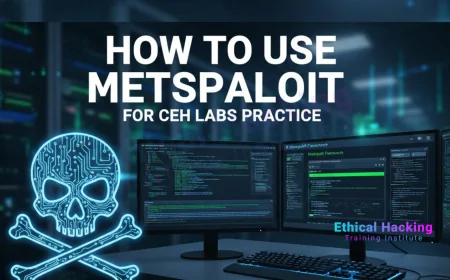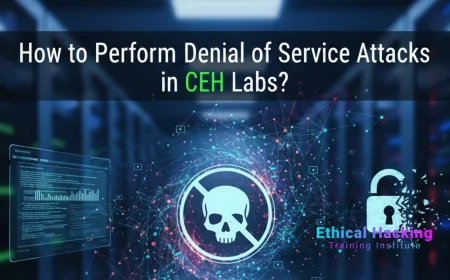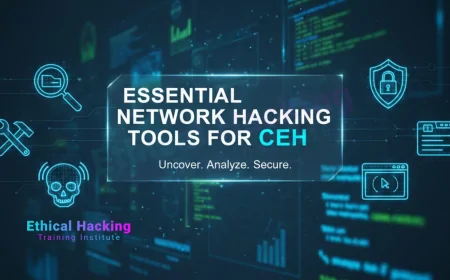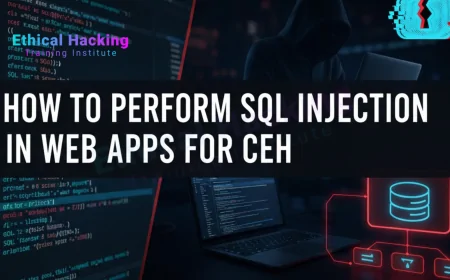Complete Ethical Hacking Certification Course Online: Learn from Experts | Online CEH Certification Course: Learn Ethical Hacking from the Best
Master ethical hacking online with expert-led certification courses. Get hands-on labs, CEH/OSCP prep, and career-ready skills—all from home.
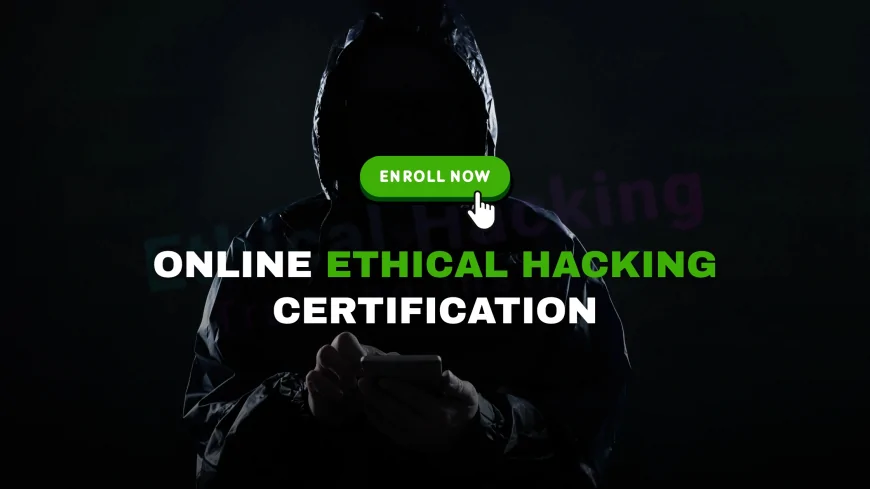
Table of Contents
- Introduction
- Why Choose an Online Ethical Hacking Course
- Popular Certifications and Providers
- Curriculum & Course Structure
- Learning from Expert Instructors
- Hands-On Labs & Virtual Environments
- Recommended Learning Path
- Study Strategies for Online Learning
- Assessments & Practice Exams
- Peer Support & Community Engagement
- Career Outcomes & Job Roles
- Pricing, ROI, and Free Resources
- Future-Proofing Your Skillset
- FAQs
- Conclusion
Introduction
In an era of ever-evolving cyber threats, mastering ethical hacking has become a crucial skill. Online certification courses offer global access to top-tier instruction, cutting-edge labs, and certification preparation—all from your home. This comprehensive guide will walk you through selecting, completing, and leveraging a top-notch online ethical hacking certification course for real-world impact and career advancement.
Why Choose an Online Ethical Hacking Course
- Flexibility: Self-paced or scheduled live sessions adapt to your time zone and commitments.
- Top-Quality Content: Courses from EC‑Council, Offensive Security, SANS, and other renowned providers.
- Cost-Effective: Online offerings are often more affordable than in-person alternatives.
- Access to Labs: Cloud-based virtual labs replicate real-world hacking environments.
- Global Peer Learning: Engage with learners and experts worldwide through forums and live Q&A.
Popular Certifications and Providers
CEH (Certified Ethical Hacker) – EC‑Council
CEH v13 is a widely respected intermediate-level certification covering fundamental hacking methodologies, tools, and practical labs (iLabs). A full online course from EC‑Council or accredited partners prepares you for both the knowledge exam and optional CEH Practical for Master status.
OSCP (Offensive Security Certified Professional)
A hands-on, expert-level credential requiring mastery of penetration testing through a 24-hour lab exam and detailed report writing. Online PWK courses from Offensive Security are self-paced with optional mentor support.
CompTIA PenTest+
A vendor-neutral, entry-to-intermediate exam combining MCQs and performance-based scenarios. Online partner courses (e.g., CompTIA CertMaster, PluralSight) make it accessible.
GIAC GPEN (GIAC Penetration Tester)
SANS-backed certification focused on methodical pen-testing techniques and tool application. Online SEC560 courses feature video lecture bundles and lab access.
eCPPT (eLearnSecurity Certified Professional Penetration Tester)
Hands-on, practical-focused exam with lab environment and unlimited exam retakes. Online training prioritizes reporting and real-world penetration case studies.
Curriculum & Course Structure
- Foundations: Networking, Linux/Windows fundamentals, scripting basics.
- Recon & Scanning: Tools like Nmap, Netcat, Recon-ng.
- Exploitation: Using Metasploit, SQLmap, Nikto.
- Post-Exploitation: Privilege escalation, persistence, data extraction.
- Web & Wireless Hacking: Burp Suite, OWASP, WPA2 cracking.
- Advanced Topics: Cloud security (AWS, Azure), IoT, mobile hacking, OT.
- Practical Reporting: Emphasis on documentation and vulnerability communication.
- Mock Exams: Include timed MCQs and performance-based challenges.
Learning from Expert Instructors
Top online courses are led by instructors with deep field experience—OSCP holders, veteran red teamers, and security consultants. These experts bring real incidents, tool demonstrations, and up-to-date industry anecdotes to your virtual classroom. Look for instructors who:
- Are certified professionals (CEH C|CT, OSCP, CISSP)
- Share lab walkthroughs and commentary
- Engage regularly via Q&A, webinars, and 1:1 mentoring sessions
Hands-On Labs & Virtual Environments
Online ethical hacking courses typically include:
- Cloud-hosted virtual labs: Time-bound VM environments emulating real systems.
- Interactive tools: Web shells, Kali Linux access, and scripting consoles.
- Challenge grids: Simulated CTF paths with escalating tasks.
- Cleanup mechanisms: Auto-reset ensures a clean slate between attempts.
Recommended Learning Path
- Start with foundational modules: Network protocols, Linux basics, and scripting over 2–4 weeks.
- Progress to core hacking topics: Recon, scanning, and exploitation over 4–6 weeks.
- Dive into advanced subjects: Web, mobile, cloud, and OT pentesting in the next 4 weeks.
- Enter mock exams: Simulate a 4-hour knowledge exam and 6-hour practical exam over 2 weeks.
- Revise weak areas: Revisit labs and repeat challenges over the final 2 weeks before certification attempt.
Study Strategies for Online Learning
- Regular schedule: 1–2 hours daily or dedicated weekend blocks.
- Active note-taking: Document tool commands, configurations, and expected outputs.
- Group projects: Partner with peers for lab walkthroughs and mutual support.
- Use forums: Platforms like Discord, Reddit (r/OSCP, r/netsec), and Slack study rooms.
- Flashcards: For memorizing port numbers, tool flags, and CVE identifiers.
- Retrospectives: Review completed labs to identify efficiency gaps.
Assessments & Practice Exams
Train using:
- Timed MCQ tests mirroring real exam environments
- Performance challenges with VM submissions (screenshots, code, findings)
- Complete mock pentest reports—write-ups, findings documentation, remediation plans
- Peer reviews—request feedback from instructors or fellow learners on your reports
Peer Support & Community Engagement
Online learners benefit immensely from community:
- Discord & Slack channels: Real-time help, labs collaboration, and motivational support.
- Reddit groups: Share success stories, Q/A, resource links and study logs.
- Server meetups: Virtual get-togethers like “Hack-n-Learn” sessions.
- Mentorship networks: Pair with experienced ethical hackers for guidance.
Career Outcomes & Job Roles
Completing an online course and certification opens many roles:
- Penetration Tester
- Security Analyst / SOC Analyst
- Red Team Specialist
- Bug Bounty Hunter
- Security Consultant
- Network or Cloud Security Engineer
Additionally, many programs offer job placement help, portfolio assistance, and interview preparation.
Pricing, ROI, and Free Resources
- CEH Online Courses: $900–1 200 (including labs and voucher)
- OSCP PWK self-paced: $1 499–2 999 based on lab access tier
- PenTest+ Prep: $350–500
- GPEN SANS bundles: $6 000–7 000 (all materials + labs)
- eCPPT: $749
ROI: Ethical hacking roles often start at $80k–120k/year. Entry-level cost typically pays off within 6–12 months of employment
Free Resource Highlights:
- OWASP WebGoat and Juice Shop for web app practice
- TryHackMe free rooms and interactive tutorials
- Metasploitable, DVWA for offline labs
- YouTube experts: The Cyber Mentor, John Hammond, etc.
Future-Proofing Your Skillset
- Stay updated in cloud security, AI-driven attacks, quantum-safe cryptography.
- Continue learning through CTFs, bug bounties, security conferences, and whitepapers.
- Pursue advanced certifications like OSCP, CISSP, CRTP, CRTO.
FAQs -
1. Can I complete an ethical hacking certification entirely online?
Yes. Providers like EC‑Council (CEH), Offensive Security (OSCP), CompTIA (PenTest+), GIAC (GPEN) and others offer full online certification courses with live or self-paced learning and labs.
2. Are online exams proctored?
Mostly, yes. Exams are often proctored via webcam and screen monitoring. Some programs also offer physical testing center options.
3. Do I need a background in IT?
Basic knowledge of networking, operating systems, and scripting greatly helps, but many programs include tutorials to address beginner gaps.
4. How much hands-on lab time is included?
Between 50 and 400+ hours depending on certification level and provider—labs are a core part of the curriculum.
5. Which certification suits beginners?
CEH and PenTest+ are great entry paths; eCPPT is good for hands-on learners; OSCP and GPEN are more advanced.
6. What system do I need for labs?
A modern laptop (8GB+ RAM, SSD), virtualization support, and a stable internet connection.
7. Is mentorship available?
Many courses include weekly live sessions, office hours, Q&A chats, and community channels where experienced instructors mentor learners.
8. How long does it take to complete?
Generally 3–6 months depending on pace and certification. Bootcamps can be completed in weeks.
9. How important are report-writing skills?
Very important. Real-world pentesting and job roles require clear documentation—most courses include modules on reporting.
10. Can I work full-time while studying?
Yes—choose self-paced or evening/weekend options designed for professionals.
11. Are there lifetime access options?
Some providers offer lifetime access for a one-time fee—ideal for continuous learning and re-certification needs.
12. What is the passing score for CEH?
Between 60–85%, based on the exam version; you need to answer around 84–106 questions correctly out of 125.
13. Is OSCP harder than CEH?
Yes—OSCP is fully practical and regarded as significantly more challenging due to its lab and reporting focus.
14. What's PenTest+?
A hybrid certification with MCQs and performance-based challenges designed by CompTIA; it's vendor-neutral.
15. Do online courses help with job placement?
Many do—especially platforms like Simplilearn, eLearnSecurity, and SANS that offer resume support and interview prep.
16. Can I do bug bounty hunting after certification?
Yes—your learned skills apply directly to bug bounty programs like HackerOne and Bugcrowd.
17. Is continuing education required?
Yes. Most certifications require periodic renewal via continuing education credits or re-examination.
18. Are there any free ethical hacking courses?
Yes—many free options exist such as OWASP resources, TryHackMe community rooms, and YouTube channels.
19. How do I track progress?
Keep a learning log, lab journal, and score mock tests periodically to track improvement.
20. What’s next after certification?
Pursue advanced certs (OSCP, CISSP), specialize in cloud/mobile/OT security, participate in CTFs, and join professional communities.
Conclusion
Online ethical hacking certification courses offer an unparalleled mix of expert instruction, hands-on labs, and global community support—all from the convenience of your location. To succeed, choose a program that aligns with your skill level and professional goals, schedule time for disciplined study and labs, and leverage peer and mentor support. The knowledge and credentials you gain can propel you into high-impact cybersecurity roles and open doors to long-term advancement.
What's Your Reaction?
 Like
0
Like
0
 Dislike
0
Dislike
0
 Love
0
Love
0
 Funny
0
Funny
0
 Angry
0
Angry
0
 Sad
0
Sad
0
 Wow
0
Wow
0






